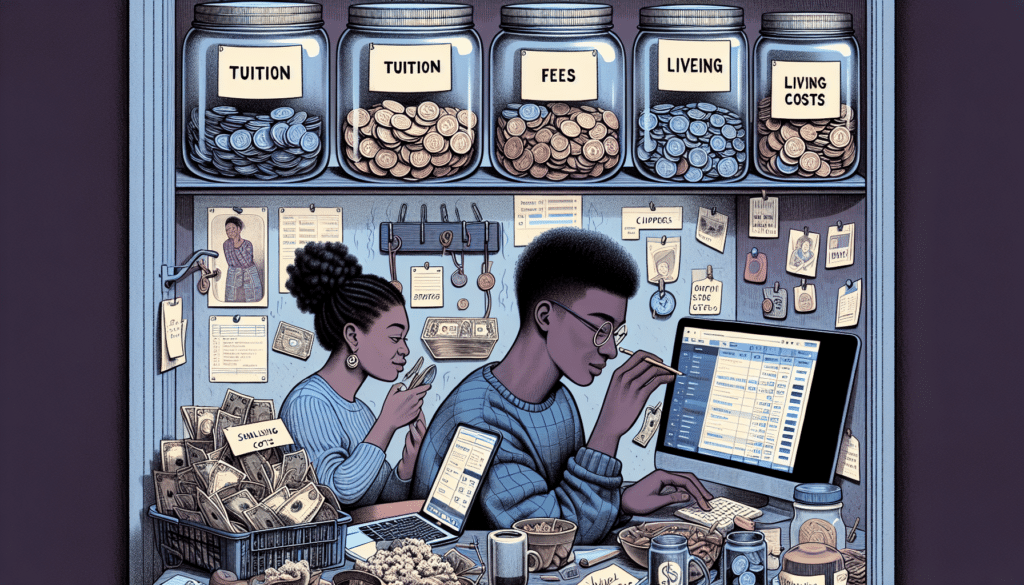Are you a student struggling to juggle your finances? Look no further. This guide is laser-focused on helping you navigate the financial maze of student life. From establishing a realistic budget to smart saving tips that don’t feel like a chore, we’ll cover essential strategies tailored specifically for budgeting for students.
Key Takeaways
- Effective budgeting involves understanding cash flow, categorizing expenses, and prioritizing essential expenditures to build a solid financial foundation during college.
- Creating a tailored budget with SMART goals and using the 50/30/20 rule for resource allocation, alongside regularly adjusting the budget, are key strategies for financial stability.
- Minimizing debt with smart borrowing, leveraging student discounts, utilizing budgeting apps, and maximizing income through part-time work or freelancing are crucial for a successful financial journey in college.
Mastering the Art of Budgeting in College

Embarking on the collegiate journey is an exciting chapter filled with opportunities and new experiences. Yet, it comes with its fair share of financial responsibilities. Mastering the art of budgeting is a pivotal step for every college student aiming to manage expenses effectively, build decision-making skills, and develop strong financial habits.
The foundation of a secure financial future is laid with a robust college student budget, enabling you to save money, minimize debt, and achieve your financial goals.
Understanding Your Cash Flow
To create a budget that isn’t just a fancy spreadsheet, start by getting a clear picture of your cash flow. This means considering all the money coming in, whether it’s from a part-time job, family contributions, or financial aid like scholarships and loans. Breaking down your total income helps you understand what you can afford on a monthly basis, ensuring that you’re not spending money you don’t have.
Remember to factor in deductions from paychecks for taxes, health insurance, and other essentials, as well as considering your living expenses.
Identifying College-Related Costs
With your income sorted, it’s time to tackle the other side of the equation: your expenses. Identifying all college-related costs goes beyond tuition and fees; it includes textbooks, campus activities, and travel expenses. Financial aid can stretch to cover books and transportation, easing the pressure on your wallet.
Utilize bank statements and receipts to gauge your average income and expenses, providing a reality check on where your money is actually going, especially in terms of monthly expenses.
Prioritizing Expenditures
Now, let’s talk about prioritizing. Not all expenses are created equal, and distinguishing between fixed and variable expenses is key. Fixed expenses, like rent and tuition, are non-negotiable, whereas variable expenses, like eating out, can be adjusted. This is where you can flex your financial wisdom—focus your funds on essentials and savings, and cut costs on non-essentials.
Crafting a Tailored Student Budget Plan

Once you’ve mastered the basics, it’s time to craft a budget plan that’s as unique as your college experience. Setting SMART financial goals—specific, measurable, achievable, relevant, and time-bound—is vital to a successful budget. Your spending plan should outline how much money goes into each expense category, giving you a clear roadmap of your finances.
Remember, flexibility is your friend; your budget should evolve with your changing financial landscape.
Allocating Resources Wisely
A smart way to allocate your resources is to use the 50/30/20 rule as a guideline. Dedicate 50% of your income to needs, 30% to wants, and squirrel away 20% for savings and future financial goals. This simple formula ensures that you’re covering your bases while still allowing yourself the occasional treat. And don’t forget about setting aside money for an emergency fund; it’s the cushion that can save you from financial stress.
Managing Unexpected Expenses
Life loves to throw curveballs, and unexpected expenses are no exception. An emergency fund is your safety net for those “just in case” moments. Aiming to cover at least one month of expenses, this fund can be a lifesaver when you’re in a pinch.
Budgeting apps like Digit can automate your savings, making it easier to build that emergency stash without feeling the pinch. And if you find yourself in the red, reassess your budget to cut unnecessary spending and, if needed, look for ways to boost your income.
Adjusting as You Go
A budget is not set in stone. Regular reviews and adjustments are crucial for staying on top of your finances and ensuring you’re not overspending or falling behind on your financial goals.
When you have a positive balance, celebrate by directing that extra cash towards your savings or paying down student loans.
Smart Spending and Saving Strategies
With a solid budget in place, let’s delve into smart spending and saving strategies that won’t leave you feeling deprived. Leveraging student discounts, utilizing budgeting apps, and learning to save money without sacrificing your college experience are all part of the savvy student’s playbook. An effective college student budget is key to achieving financial success during your academic journey.
Leveraging Student Discounts

Your student ID is more than just a library card—it’s your ticket to a treasure trove of discounts. Many businesses offer student discounts on tech goodies like Adobe’s Creative Cloud and Apple products to fashion finds at Nike and Madewell. Platforms like UNiDAYS and Student Beans are goldmines for deals, and cashback apps like Rakuten put money back in your pocket with every purchase.
It’s a no-brainer—take advantage of these discounts to keep more money in your bank account.
Utilizing Budgeting Apps
In the digital age, budgeting apps are your financial command center. They let you track your spending, set and adjust financial goals, and manage your finances on the fly. Start by using apps like Goodbudget to get a real-time snapshot of your spending habits, which is the first step to reigning in unnecessary expenses.
For the investment-curious, apps like Acorns offer an easy entry into the world of growing your money.
Saving Without Sacrifice
Saving money doesn’t mean missing out on the fun. Here are some ways to enjoy leisure activities without breaking the bank:
- Look for reduced rates at movie theaters
- Take advantage of special deals on transportation like Amtrak and Megabus
- Use digital services like Spotify and Apple Music that offer discounted rates for students
- Take advantage of special pricing for students at food delivery services and popular eateries
With these options, you can still indulge in leisure activities without the guilt.
And remember, small investments can add up—apps like Acorns turn spare change into a growing nest egg.
Minimizing Debt While Studying
As important as managing your money is, minimizing debt while studying is equally crucial. It’s all about smart borrowing, avoiding credit card pitfalls, and finding alternatives to loans that can saddle you with years of repayments.
Avoiding Credit Card Pitfalls
Credit cards can be a double-edged sword. To avoid falling into a debt trap, it’s essential to:
- Understand the terms and conditions of your card
- Ensure you pay more than the minimum due each month
- Tackle smaller balances or high-interest cards first
Doing these things can help keep the debt monster at bay.
And don’t be shy about negotiating with creditors for better rates or waived fees—it’s a smart move that can lead to significant savings.
Borrowing Smartly
When it comes to student loan debt, knowledge is power. Familiarize yourself with repayment options and aim to pay off interest before it capitalizes. Income-driven repayment plans are a lifeline for those with fluctuating incomes, offering manageable payments and the promise of loan forgiveness after a certain period.
The FUTURE Act simplifies the process of adjusting payments based on income, ensuring you’re not drowning in debt post-graduation.
Seeking Alternatives to Loans
There’s a world of financial aid beyond student loans. Grants, scholarships, and work-study programs are just a few alternatives that don’t require repayment. Private organizations and special aid programs for military families also offer financial support that can lighten the load of college costs.
Maximizing Income Opportunities

Beyond keeping expenses in check, maximizing your income as a student can provide a crucial financial boost. From part-time jobs that fit around your class schedule to the flexible world of freelancing, there are several avenues to explore for increasing your monthly income.
Finding Flexible Part-Time Work
The hunt for a part-time job should prioritize flexibility. Employers who value your education and can accommodate your study needs are gold. On-campus jobs, such as library positions or teaching assistantships, are ideal for fitting work into your academic life. And don’t overlook online job portals—they can be a treasure trove of opportunities tailored to student schedules.
For those who crave independence, the gig economy offers roles like rideshare driving or pet sitting on your own terms.
The Freelance Option
Freelancing is the ultimate flexible job—a chance to earn money on your schedule. Whether you’re a budding writer, designer, or digital marketer, freelancing gigs can be both lucrative and adaptable to your college commitments. With rates that can compete with traditional part-time jobs, you control your workload and build valuable skills along the way.
Exploring On-Campus Employment
On-campus employment is not only convenient but can also come with perks like tuition discounts. These positions are designed to accommodate student schedules, making it possible to earn money without compromising your studies.
Tools and Resources for Effective Budgeting

Navigating the financial aspects of college life requires the right tools and resources. From budgeting apps to financial literacy materials, these assets can help you manage your finances and plan for the future.
Choosing the Right Budgeting Tool
Selecting the right budgeting tool is a personal decision. Look for apps that sync with your bank accounts and offer customization to fit your financial picture. Whether it’s an app or a spreadsheet, the best tool for you is the one that you’ll actually use and that helps you stay on track with your budgeting goals.
Accessing Financial Education Resources
Many college campuses offer financial education resources, such as workshops and counseling, to help you build your financial knowledge. Additionally, government and nonprofit organizations provide a wealth of information and tools to help you make informed financial decisions.
Practical Tips for Everyday Savings
To round out your financial toolkit, let’s explore some practical tips for everyday savings that can make a real difference in your bank account. From making economical food choices to finding free entertainment and reducing recurring bills, small changes can lead to big savings.
Economical Food Choices
Navigating the culinary landscape on a student budget doesn’t have to mean a parade of instant noodles. Embracing economical food choices, such as cooking simple meals at home and engaging in meal prepping, can significantly slash your grocery bills.
From whipping up a hearty chicken and veggie dish to assembling microwave-friendly meals, the key is to keep it straightforward and satisfying. Don’t forget the joys of communal cooking; group meals with friends and family members not only save costs but also create priceless memories.
Free Entertainment Options
Who says you have to spend a fortune to have fun? Free entertainment options abound for the resourceful student. Campus events offer a wealth of activities at no cost, and free public transportation provided by many colleges can get you there without dipping into your entertainment fund.
Embrace the vibrant college life filled with opportunities for college students to socialize and grow, all within your budget.
Reducing Recurring Bills
Your financial health can benefit greatly from trimming the fat off your recurring bills. Keep an eye out for ‘money leaks’—those sneaky, ongoing charges for services you hardly use, like gym memberships or streaming services you’ve outgrown.
Canceling unused subscriptions and renegotiating plans for necessities like your cell phone bill can keep more of your hard-earned money in your pocket.
Summary
As you stand at the threshold of your academic and financial future, remember that the art of budgeting is a continual process, requiring commitment and adaptability. By understanding your cash flow, identifying expenses, and crafting a budget tailored to your college life, you’re taking control of your financial destiny. Embrace the art of smart spending, maximize income opportunities, and utilize the wealth of budgeting tools and resources at your disposal. With these strategies in your arsenal, you’re not just surviving the college experience—you’re thriving within it.
Frequently Asked Questions
The best way to start budgeting as a college student is to understand your cash flow, identify your sources of income and expenses, prioritize essential costs, and use budgeting tools to track your spending and make adjustments as needed.
To save money on textbooks and school supplies, consider using student discounts, buying used or renting textbooks, and exploring digital alternatives to traditional supplies. Using these methods can help you save on expenses and stay within your budget.
Yes, Mint and Goodbudget are popular budgeting apps that can help students track expenses and manage finances conveniently.
If you find yourself with unexpected expenses, prioritize reducing non-essential spending and finding ways to increase your income temporarily to cover the costs. It’s also important to have an emergency fund in place to prepare for such situations.
Yes, taking on a part-time job can affect your studies if not managed properly. Look for flexible work that fits your class schedule and set clear boundaries to maintain a balance.






